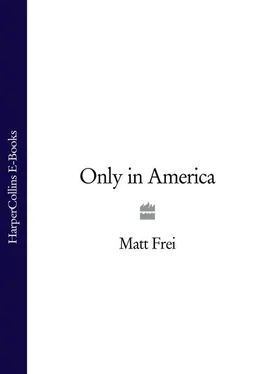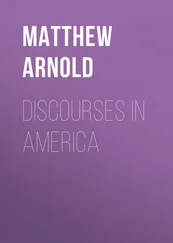MATT FREI
Only in America
DEDICATION Dedication Black Man Given Nation’s Worst Job Arriving 1 Beltway Blues 2 Tilden Street 3 The Colour of Fear 4 1600 Pennsylvania Avenue 5 Grovelling for Votes 6 Weather You Can Call Names 7 God is Everywhere 8 Defenders of the Constitution or Scum of the Earth? 9 Think-Tank Alley 10 The Tyranny of Comfort 11 The Colour of Money 12 Class Without War 13 School Citizens 14 Whose American Dream is it Anyway? Afterthoughts Index Acknowledgements About the Author Praise By the Same Author Copyright About the Publisher
For my family George, Amelia, Lottie, Alice and Penny
Cover
Title Page MATT FREI Only in America
Dedication DEDICATION Dedication Black Man Given Nation’s Worst Job Arriving 1 Beltway Blues 2 Tilden Street 3 The Colour of Fear 4 1600 Pennsylvania Avenue 5 Grovelling for Votes 6 Weather You Can Call Names 7 God is Everywhere 8 Defenders of the Constitution or Scum of the Earth? 9 Think-Tank Alley 10 The Tyranny of Comfort 11 The Colour of Money 12 Class Without War 13 School Citizens 14 Whose American Dream is it Anyway? Afterthoughts Index Acknowledgements About the Author Praise By the Same Author Copyright About the Publisher For my family George, Amelia, Lottie, Alice and Penny
Black Man Given Nation’s Worst Job
Arriving
1 Beltway Blues
2 Tilden Street
3 The Colour of Fear
4 1600 Pennsylvania Avenue
5 Grovelling for Votes
6 Weather You Can Call Names
7 God is Everywhere
8 Defenders of the Constitution or Scum of the Earth?
9 Think-Tank Alley
10 The Tyranny of Comfort
11 The Colour of Money
12 Class Without War
13 School Citizens
14 Whose American Dream is it Anyway?
Afterthoughts
Index
Acknowledgements
About the Author
Praise
By the Same Author
Copyright
About the Publisher
BLACK MAN GIVEN NATION’S WORST JOB
The National Mall is the Circus Maximus of Washington, DC. Instead of chariot races and gladiatorial battles, it plays benign host to rallies, concerts, charitable walks against breast cancer or armies of tourists shuffling dutifully past the war monuments, the shrines to the Founding Fathers and the museums that form the granite and marble core of a city that refers to itself, somewhat self-consciously, as ‘the Nation’s Capital’. The steps to the grandiose Lincoln Memorial, illuminated at night like a pop-up Parthenon, were glistening with early November drizzle. It was one in the morning and a small crowd had gathered at the foot of the lugubrious Abraham Lincoln, a giant sitting back in his huge throne, in brooding disapproval of the world around him.
It was a motley gathering of students, tourists and some interns from Capitol Hill, clutching a bottle of champagne. They were all huddled around a radio as if listening intently to football scores. But the mood was too intimate and reverential for sport. In any case this was the middle of the night. One of the women, an African American, was crying silently as she listened. The make-up on a young white woman’s face was smudged with tears or rain. I couldn’t tell. What seeped out of the small wireless wasn’t the excitable voice of a sports commentator. It was the brown-sugar baritone of a politician. The voice rose and fell as if delivering a sermon. And when the speaker said that ‘the true strength of our nation is not the might of our arms or the scale of our wealth but the enduring power of our ideas’ the small radio crackled and hissed to the sound of mass applause. The gathering at the Lincoln Memorial nodded silently in collective approval. In the distance someone was hollering with apparent joy. A car passed by blaring out the popular country song ‘Only in America’.
Half a mile away at the White House a much bigger crowd had assembled. Washington, DC doesn’t usually go in for spontaneous human gatherings, especially in the middle of the night. But something had brought the streets to life. The sound of car horns echoed off the inscrutable glass and steel towers on K Street, home to the city’s most powerful lobbying firms. Even the anti-nuclear protester who has been living in his tent outside the White House for as long as I can remember, forever threatening but thankfully never achieving self-immolation, had crept out of his lair and was now staring through the black wrought-iron gates of 1600 Pennsylvania Avenue. There was nothing to see. George and Laura Bush, famous for retiring to bed early, were probably fast asleep by now. A lone sharpshooter was patrolling the roof.
But the crowd had not come to gawp. They had come to imagine. In a few months a family would reside here that descended from the slaves who had helped to build this replica of a Virginia tobacco planter’s mansion two centuries earlier. As an African American, Barack Obama could have been legally owned by America’s first sixteen Presidents. Now he and his wife Michelle and their daughters Sasha and Malia would move into the White House, not as cooks, cleaners or advisers, but as the First Family. Millions of Americans doubtlessly felt that such an event was horribly overdue. Millions more around the world had doubted it would ever come to pass. The airwaves, the internet, the newspapers had been filled for months with meticulous polling data, touch-screen electoral maps and convoluted conjecture about why an African American would be acceptable to a largely white electorate. Or why not. Entire days of broadcasting time had been spent discussing the so-called Bradley Effect, named after a former African American candidate for the governorship of California who was soaring in the opinion polls but lost in the privacy of the polling booth because too many voters were simply too racist. But that was 1982 and this was now 2008. And wherever you were on that night and whoever you wanted to win, you had to pinch yourself that on 4 November sixty-two million Americans had elected a forty-seven-year-old black Senator called Barack Hussein Obama to be the forty-fourth President of the most powerful nation on earth.
Call it the stomach-knot-forming sensation of history. And what formed that knot weren’t the returns from those crucial swing states of Ohio or Pennsylvania, or the moment that California and Washington state tipped him over the 270 electoral votes that a candidate needs to win. No, it was the simple image of seeing America’s first black First Family walk onto the stage at Grant Park in Chicago in front of half a million people. Jesse Jackson, the veteran civil rights campaigner who had stood next to Martin Luther King when he was shot forty years earlier in Memphis, was buried in the crowd, his face streaming with tears. He too had tried to make a run for the White House two decades earlier but failed. Jackson had been at times lukewarm, critical and downright obscene about Obama’s candidacy. Like many other leaders from the civil rights generation, Jackson at first thought that Obama, with his white mother and Kenyan father, wasn’t black enough. Obama was not the descendant of slaves. He had not been branded by history. His skin colour, like his candidacy, represented a compromise to purists in the civil rights movement. That compromise only became acceptable as they realized that the candidate had a real chance of becoming President.
The other famous face in the crowd belonged to Oprah Winfrey, the fabulously wealthy entertainer and talk-show hostess who had supported Obama from the start and had organized mass rallies on his behalf. ‘He is the one …’, she once declared, sounding more as if she was touting a Messiah than a candidate for public office. Oprah’s endorsement from the sofa pulpit of her television show dusted Obama with mainstream appeal and introduced him to legions of white housewives who were only dimly aware of the lanky politician with the exotic name. The rest of the vast crowd in Chicago was anonymous: a mixture of white, black, Hispanic, young and old. They were cheering, crying, laughing or just open-mouthed with astonishment. In our studio in Washington, DC I watched Trent Duffy, the young spokesman of the outgoing Bush White House, watch the pictures from Chicago. He too gulped. A McCain supporter, he couldn’t help but feel a moment of pride. Whatever you thought of Obama as a candidate or of his potential as a future President, this was a night to remember. America had reintroduced itself to the rest of the world.
Читать дальше

![Нил Уолш - Единственное, Что Имеет Значение [The Only Thing That Matters]](/books/393630/nil-uolsh-edinstvennoe-chto-imeet-znachenie-the-onl-thumb.webp)










